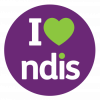What is NDIS Early Intervention?
If your child is living with disability or has started showing signs of developmental delay, NDIS early intervention is absolutely critical. It provides children with the proper support at the right time, when it will make a considerable difference.
The NDIS helps families get the right level of support as soon as possible through the Early Childhood Approach. This dedicated support is designed to improve their functioning, and make everyday things like talking, moving around, playing and joining in with family and community life less overwhelming and more manageable. The sooner your child starts their support, they’ll have every chance to grow, learn and reach their full potential.
Ability Action Australia offers early intervention support services designed to help children and their families truly thrive.
What Age is Early Intervention Available Under the NDIS?
Early intervention through the NDIS Early Childhood Approach is typically available to children aged 6 to 9 with a confirmed diagnosis. For children under 6, a formal diagnosis isn’t required if there’s a significant developmental delay. For example:
- A 3-year-old showing signs of delayed speech and motor development may be eligible for support without a diagnosis.
- A 7-year-old exhibiting similar challenges would typically require a confirmed diagnosis to access early intervention.
Learn more about the early intervention support services provided by Ability Action Australia for children under 9.
Is There an Early Intervention NDIS Age Cut-Off?
Yes, there is an NDIS early intervention age cut-off. At age 9, children typically transition from early childhood supports to other NDIS supports. However, the support doesn’t stop; it simply changes to reflect your child’s evolving needs. The NDIS and service agencies facilitate this process to ensure it runs smoothly and provides optimal support.
Depending on how well the child is doing and the situation, there are several possible outcomes:
- They will no longer require support if they’ve caught up developmentally with their peer group.
- They might transition to mainstream support, e.g., school or local services.
- They may be able to stay with the NDIS so they can receive a range of support appropriate to their age and needs.
The objective is always to provide the right support at the right time.
What Happens When My Child Turns 9?
Your child will start moving from early childhood support to other NDIS domains as they get closer to turning 9. This is a standard component of the NDIS Early Childhood Approach, which is intended to ensure that children keep receiving the support they need as they develop.
Here’s what an NDIS early intervention age transition usually involves:
- Reassessment of your child’s needs
Your child’s NDIS Early Childhood Partner will discuss their progress and continuing support needs with you. The discussion helps determine what kinds of support will be most beneficial in the future. - Transition to a new NDIS support stream
If your child still requires support, they’ll move from early childhood to another part of the NDIS for the types of support typically available for children aged 9 and over. - Continuity of care
While the type or category of support can change, the care doesn’t stop. The aim is to ensure continuity and provide your child with the tools and services required to continue developing and engaging in daily life.
The outcome of the reassessment will determine the next steps.
- Your child may no longer need support if they’ve caught up developmentally.
- They might access mainstream supports through schools or community services.
- Or they may continue with NDIS-funded support under a different category.
To learn more about what this next stage can look like, visit our page on children over 9.
Is My Child Eligible for NDIS Early Intervention?
Your child may be eligible for NDIS early intervention support if they meet the following general criteria:
- Aged 0–9 years
- Being a citizen, permanent resident or holder of a protected Special Category Visa in Australia
- Has a disability or developmental delay that affects their capacity to engage in daily activities
You can visit the NDIS website for more thorough eligibility details.
Why Does Early Intervention Focus on Younger Ages?
Research consistently shows that the earlier a child receives support, the better their long-term outcomes. During the early years, children’s brains are developing rapidly, making it an ideal time to build essential skills and lay the foundation for lifelong learning and wellbeing.
Early intervention can benefit:
- Language and communication
- Social and emotional development
- Behaviour and emotional regulation
- Gross and fine motor skills
The NDIS recognises the importance of acting early to support children’s development. Here’s why it matters:
1. Maximises developmental outcomes
By identifying and addressing challenges early, children have a better chance of developing essential skills in communication, movement, behaviour and learning.
2. Builds long-term independence
Early supports can help children gain the tools and confidence they need to participate more fully in everyday life at home, school or in the community. This can reduce the need for more intensive support later in life.
3. Supports families and caregivers
Early intervention isn’t just good for the child — it’s also good for families. It gives parents and carers strategies, education and emotional support to help their child thrive.
4. Supports lifelong wellbeing
Acting early on developmental needs helps children build positive behaviours, wellbeing, and strong social connections.
5. Tailored to the individual
Through the NDIS, early intervention is personalised to meet the unique needs of each family and child. This ensures that the ideal mix of resources, support and therapy for every individual’s goals.
You can learn more about the benefits of early intervention through the NDIS’s Early Childhood Approach for children under 9.
How Ability Action Australia Can Support You
As a registered NDIS provider, Ability Action Australia is ready to guide families through the early childhood support with confidence and care. Our team includes supportive key workers and experienced early childhood clinicians who work closely with families to deliver tailored early intervention support services that meet each child’s unique needs.
Whether you’re just starting your journey or looking for extra guidance, we’re here to help. Learn more about how our Early Childhood Support Team can make a difference in your child’s development.
Ready to take the next step? Get in touch with us or make a referral today.
Frequently Asked Questions
Yes, children can still apply for NDIS support if they are under 9 years old at the time of application. If your child is approaching their 9th birthday, it’s important to act quickly. Reaching out early ensures they don’t miss out.
The NDIS will evaluate your child’s unique needs and then identify the best kind of support. Depending on your child’s age and developmental stage, this support may be offered through the early childhood strategy or another NDIS pathway.
Not always. Children under 6 can access early intervention without a formal diagnosis if they have a developmental delay. Children aged 6 to 9 may need a confirmed diagnosis to be eligible. For more information, visit the NDIS’s Early Childhood Approach for children under 9.
Yes, there were actually new developments to the NDIS early intervention process. The limit on the older end of early childhood support was increased from 7 to under 9 years, reflecting those important development years.
In addition, the language has shifted from ‘ECEI’ (Early Childhood Early Intervention) to ‘Early Childhood Approach’, reflecting a more concise and family-focused term of describing the service. The changes were made on the advice of experts to provide ongoing support until children are 9 years old.

